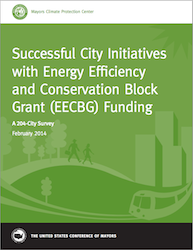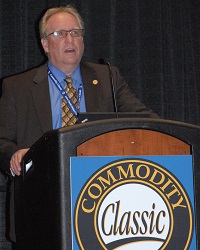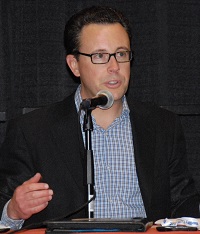 Valero Energy Corporation has announced that Bill Klesse, 67, has chosen to step down as Chief Executive Officer effective May 1, 2014. Klesse will remain a Valero director and Chairman of the Board. Joe Gorder, 56, who was named Valero’s President and Chief Operating Officer in 2012, was elected to the role of CEO effective May 1 and has also been elected a director by the Board of Directors. Gorder will join Valero’s Board of Directors immediately.
Valero Energy Corporation has announced that Bill Klesse, 67, has chosen to step down as Chief Executive Officer effective May 1, 2014. Klesse will remain a Valero director and Chairman of the Board. Joe Gorder, 56, who was named Valero’s President and Chief Operating Officer in 2012, was elected to the role of CEO effective May 1 and has also been elected a director by the Board of Directors. Gorder will join Valero’s Board of Directors immediately.- Renewable generation was up 30% for the week ending February 20, 2014, according to recent estimates from Genscape’s Generation Fuel Monitor Report. The total weekly generation of 11,982 GWhs was the second highest weekly number in the past five years. Wind generation in the Midwest appears to be a significant driver of the increase week-over-week. Genscape’s monitored hydro generation in the Pacific Northwest was also up 39% (612 GWhs), despite the ongoing drought conditions. As a result of the increase in renewables and weaker power demand, gas consumption plummeted 35% (-7,847 GWhs).
- DTE Energy has selected 122 solar energy projects in the third offering of its expansion of the SolarCurrents customer-owned pilot program, which offers customers a more affordable way to install solar photovoltaic systems on their homes and businesses. The SolarCurrents program is offering an additional 2 megawatts (MW) of capacity to be fully subscribed by Dec. 31, 2015. The projects that weren’t selected can reapply for Offering 4, which starts June 23. The application deadline is July 23.
- The North and South American solar photovoltaic (PV) installed capacity will increase more than tenfold over the coming years, climbing from 13.1 Gigawatts (GW) in 2013 to 138.8 GW by 2030, at a massive Compound Annual Growth Rate of 15%, says a new report from research and consulting firm GlobalData. According to the report, the Americas’ power generation from solar PV installations will also increase at an impressive rate, jumping from 21 Terawatt-hours (TWh) in 2013 to 234 TWh by 2030.
Mayors Leading Way in Energy Efficiency
This week the mayors from across the U.S. released results of a new survey pointing to successes of cities using Energy Efficiency and Conservation Block Grant (EECBG) program funding under the American Recovery and Reinvestment Act (ARRA) to improve energy efficiency and lower carbon emissions.
 Unveiled by Gresham, Oregon Mayor Shane Bemis, Bridgeport, Connecticut Mayor Bill Finch, and Carmel, Indiana Mayor Jim Brainard, the survey findings derived from the responses of 204 mayors demonstrate how cities invested their EECBG program funds to help further local initiatives to reduce energy use, deploy new energy technologies and curb harmful energy emissions, among other local outcomes. All three mayors are members of the Mayors’ Climate Protection Center.
Unveiled by Gresham, Oregon Mayor Shane Bemis, Bridgeport, Connecticut Mayor Bill Finch, and Carmel, Indiana Mayor Jim Brainard, the survey findings derived from the responses of 204 mayors demonstrate how cities invested their EECBG program funds to help further local initiatives to reduce energy use, deploy new energy technologies and curb harmful energy emissions, among other local outcomes. All three mayors are members of the Mayors’ Climate Protection Center.
“These findings underscore that mayors have been leading by example on energy efficiency and conservation for years,” said Gresham Mayor Shane Bemis, Chair of the Conference’s Energy Committee. “Mayors all across the country have been actively working to advance energy-saving measures in communities large and small, and what we see in this report translates into real budgetary savings, local job creation and small business growth.”
Some of survey’s key findings include:
- The three top uses of EECBG dollars by cities were energy retrofits of government buildings (83 percent of cities), LED/other energy-efficient street lighting (42 percent), and solar energy systems on public buildings and facilities (31 percent).
- Most mayors directed a majority of their EECBG funds to investments in municipal projects and operations. Nearly seven in eight mayors (87%) expended a majority of their EECBG grant dollars on municipal projects and operations.
- LED/other energy-efficient lighting ranked first among energy technologies that have already been deployed by cities, with local and federal resources, most notably EECBG grants, providing the primary sources of funding for these deployments.
- The availability of EECBG funds to cities has influenced city budgetary priorities, and also prompted new partnerships with a range of private sector and governmental entities.
- A majority of mayors cited energy service contracting as the innovative energy financing strategy that EECBG funds helped most often.
Of the report’s findings, Bridgeport Mayor Bill Finch, who Co-Chairs the Conference’s Energy Independence and Climate Protection Task Force noted, “Even as mayors were confronting budget constraints due to the recession and federal spending cuts, this report shows that cities leveraged EECBG dollars by making investments that are still paying dividends today. In my city, we are reducing electricity usage and making solid waste and sewage sludge operations more efficient. So, clearly, this modest federal commitment has bolstered mayors’ efforts to advance energy efficiency, conservation and technology deployment initiatives in their cities.”Read More
Arming for a Fact-Based Fight Over Ethanol
 It’s not always fact-based arguments proponents of ethanol are up against when battling Big Oil. But that’s why it’s all more important to make sure you have good facts on your side in the fight. Farmers who attended the recent Commodity Classic in San Antonio were able to sit in on a session titled, “Biofuels and the Renewable Fuels Standard, A Farmer’s Avenue to American Energy Independence,” to make sure they can talk about the success stories and silence ethanol’s critics.
It’s not always fact-based arguments proponents of ethanol are up against when battling Big Oil. But that’s why it’s all more important to make sure you have good facts on your side in the fight. Farmers who attended the recent Commodity Classic in San Antonio were able to sit in on a session titled, “Biofuels and the Renewable Fuels Standard, A Farmer’s Avenue to American Energy Independence,” to make sure they can talk about the success stories and silence ethanol’s critics.
“Because of our success, we’ve had Big Oil really come after us and say, ‘We’re not going to lose anymore market share,'” says Jack Bernens, session moderator and marketer of Syngenta’s Enogen corn, specifically designed for ethanol production. “When monopolies get threatened, they like to push back hard.”
Hear more of what Jack had to say here: Jack Bernens, Syngenta
 Jack was joined on the panel by Brian Jennings with the American Coalition for Ethanol, who echoed Jack’s view that you’re not necessarily battling facts when it comes to taking on some of the myths put out by the petroleum industry.
Jack was joined on the panel by Brian Jennings with the American Coalition for Ethanol, who echoed Jack’s view that you’re not necessarily battling facts when it comes to taking on some of the myths put out by the petroleum industry.
“The message I was trying to relay to the corn growers is stay involved, remain engaged, get your neighbors and friends involved, and know that this isn’t a fact-based fight. When the fight is about facts, we always win,” Brian says, adding that ethanol doesn’t have to stoop to the lies and scare tactics of Big Oil.
Listen to Brian’s interview here: Brian Jennings, American Coalition for Ethanol
 Another effective tool in the fight is showing the positive change ethanol has brought to Rural America, creating better markets for farmers’ corn, helping the country achieve energy independence, and building up communities, like the one that Northwest Iowa corn farmer James Doxtad comes from. He says while many folks back in his home state are aware of the good the renewable fuel has brought to the heartland, too many people in the country just don’t know. “It’s amazing how many people out there are unaware of the advantages of ethanol. Ethanol is a good thing, and we’re producing a good product, and we’re doing it for a good reason.” he says.
Another effective tool in the fight is showing the positive change ethanol has brought to Rural America, creating better markets for farmers’ corn, helping the country achieve energy independence, and building up communities, like the one that Northwest Iowa corn farmer James Doxtad comes from. He says while many folks back in his home state are aware of the good the renewable fuel has brought to the heartland, too many people in the country just don’t know. “It’s amazing how many people out there are unaware of the advantages of ethanol. Ethanol is a good thing, and we’re producing a good product, and we’re doing it for a good reason.” he says.
Check out James’ interview here: James Doxtad, Holstein, Iowa
Meanwhile, all three might get some help spreading the word as Syngenta released a new documentary video titled, “Ethanol: Fueling Rural America’s Future – One Community at a Time,” that provides a platform for farmers, ethanol producers and industry advocates to share their passion for an industry critical to the future of agriculture and rural America.
Up and Downstream Thoughts on Biodiesel Finishing
 There are some varying lines of thought when it comes to cleansing and polishing biodiesel, especially whether to do it upstream or downstream in the process. This story from Biodiesel Magazine lays out some of the pros and cons for both.
There are some varying lines of thought when it comes to cleansing and polishing biodiesel, especially whether to do it upstream or downstream in the process. This story from Biodiesel Magazine lays out some of the pros and cons for both.
“In many cases, it’s a better solution to fix problems at their source rather than to treat the symptoms,” says Warren Barnes, vice president of consulting firm Frazier, Barnes & Associates. “Biodiesel quality prior to any purification step is a critical factor in determining procedure.” Typically the impurities to be removed in purification should be as low as possible upstream of the washing method, whether the plant uses water-washing or dry-washing with silicates or ion exchange resins. Oil-Dri Corp. of America focuses sales of its Select adsorbents on the front side of the biodiesel process, says Bruce Patsey, vice president and general manager of Oil-Dri. “By cleaning up the oil prior to transesterification, metals can be better controlled and the reaction with the catalyst is much more efficient for producing FAME,” Patsey says. “Many biodiesel refineries clean up their oil source with adsorbents prior to transesterification.” After transesterification, separation is essential for the removal of glycerin, salts and soaps. Settling tanks, coalescers or centrifuges are all means to separate. Rod Yawn, president of ALX Enterprises, a manufacturer of DW-R10 dry-wash resins, says approximately 80 percent of biodiesel producers use simple settling tanks, about 15 percent use centrifuges and the remainder use coalescers.
Whichever method is used, experts say producers need to keep in mind the entire production process and try to keep feedstocks consistent.
Targray Selling Biodiesel From California Terminal
 California-based biodiesel supplier Targray is now selling the green fuel from Bakersfield, Calif. This company news release says B99 and B100 are being sold to a growing market in the state.
California-based biodiesel supplier Targray is now selling the green fuel from Bakersfield, Calif. This company news release says B99 and B100 are being sold to a growing market in the state.
“Targray has been a major supplier of biodiesel by railcar to the California market. We are pleased to take it a step further by providing our customers with this strategic California inventory location able to serve both the North and the South,” said Andrew Richardson, President of Targray.
“We have several active customers in California,” states Dan Murray, Targray Vice President, “We are now reaching out to them to make them aware that they can pick up full truckloads or even splash blend with us now in Bakersfield,” concludes Murray.
Targray has been in the high-tech manufacturing and energy markets for 25 years.
Biodiesel Finds Allies at Commodity Classic
 Commodity Classic is the annual meeting that attracts more than 7,000 corn, soybean, wheat and sorghum farmers, but it’s also a great place to find biodiesel and ethanol producers. Joe Jobe, CEO of the National Biodiesel Board (NBB) says they make sure to connect with their allies from the commodity groups, especially those soybean growers.
Commodity Classic is the annual meeting that attracts more than 7,000 corn, soybean, wheat and sorghum farmers, but it’s also a great place to find biodiesel and ethanol producers. Joe Jobe, CEO of the National Biodiesel Board (NBB) says they make sure to connect with their allies from the commodity groups, especially those soybean growers.
“Biodiesel is made from a variety of feedstocks, but soy has always been the predominant feedstock for biodiesel and will be going forward,” he says, although corn oil from ethanol plants and animal fats have been making their mark in the green fuel as well. “The soybean leadership has really created the roots for biodiesel, and we still come to connect with our soybean farmer friends and leaders and talk about the status of biodiesel.”
And there was plenty to talk about at Commodity Classic when it comes to biodiesel. The double-whammy of the Environmental Protection Agency (EPA) proposing to cut in half the amount of biodiesel to be blended into the Nation’s fuel supply and the expiration of the $1-a-gallon federal biodiesel tax credit has made for plenty of conversations. Joe is really perplexed at the cut to the share of biodiesel in the Renewable Fuels Standard (RFS) considering how biodiesel is able to make up a lot possible shortfalls from cellulosic and blend wall issues facing ethanol.
“Biodiesel filled virtually the whole advanced biofuel pool, not just the biomass-based diesel pool. And because biodiesel has been so successful, the advanced biofuel goals have been met or exceeded every single year of the [RFS, despite] other advanced biofuels not coming online as quickly as hoped,” Jobe says.
The soybean growers Jobe and his folks have been able to connect with at Commodity Classic have been big allies in the push to get the RFS levels restored, but he’s also seeing help coming from corn growers who obviously have a bigger stake in what happens to ethanol but are pushing to keep the RFS as it was intended because of how it lifts all biofuels. He’s optimistic all of their efforts will be successful. “We have to believe the EPA is going to do the right thing, because the right thing is so easy and so obvious,” said Jobe.
Listen to my interview with Joe here: Joe Jobe, CEO of NBB at Commodity Classic
2014 Commodity Classic Photos
BioEnergy Bytes
 SunEdison has announced that it has collaborated with the Global Academy of Technology (GAT) in Bangalore to create a research and development facility at the college’s Bengaluru campus. Students will work with SunEdison scientists and engineers to research and improve technology for solar water pumps, energy storage solutions, hybrid energy systems, solar power plant monitoring and mounting structures.
SunEdison has announced that it has collaborated with the Global Academy of Technology (GAT) in Bangalore to create a research and development facility at the college’s Bengaluru campus. Students will work with SunEdison scientists and engineers to research and improve technology for solar water pumps, energy storage solutions, hybrid energy systems, solar power plant monitoring and mounting structures.- JA Solar Holdings Co., Ltd. has announced that it will supply 7.8MW of its high-efficiency full square mono solar modules to British Solar Renewables for use on a 7.8MW solar farm in the south-western United Kingdom. Shipments of the JAM6R 270W P-Type modules in a 60-cell format are expected to be completed during the first quarter of 2014.
- The Stark County zoning commission has approved the permitting for a wind energy project that would include up to 55 wind turbines across Stark and Morton counties in North Dakota. About 25 percent of the farm would be in Stark County. The wind farm – Stark County’s first – would cover 11,000 acres.
- The Delaware Soybean Board has partnered with the Delmarva Tractor Pullers Association to name biodiesel the official fuel of the inaugural Delmarva Tractor Pullers Association Super Pull. The event will take place Saturday and Sunday, March 8-9, 2014 at the Delaware State Fairgrounds in Harrington, Delaware.
Documentary: How Ethanol Fuels America
Syngenta has released a new documentary video entitled “Ethanol: Fueling Rural America’s Future – One Community at a Time.” According to the company, the video provides a platform for farmers, ethanol producers and industry advocates to share their passion for an industry critical to the future of agriculture and rural America.
Syngenta developed the video to reinforce the ethanol industry’s positive impact on the U.S. economy and American energy independence. The company says ethanol production is a vital  contributor to the national Gross Domestic Product, federal tax revenues, and the creation and support of new jobs across the country.
contributor to the national Gross Domestic Product, federal tax revenues, and the creation and support of new jobs across the country.
“As ethanol plants have moved into small towns and established their businesses, they have provided well-paying jobs and stabilized the corn market price,” said Jack Bernens, head of marketing and stakeholder relations for Syngenta. “That income is circulating back through rural communities. With the Renewable Fuel Standard (RFS) under scrutiny, we wanted to help tell that story.”
Ethanol is also helping consumers. A University of Wisconsin/Iowa State University study found that in 2011 ethanol reduced wholesale gasoline prices by $1.09 per gallon nationally. Looking ahead to the adoption of blends with an ethanol level greater than E10, Growth Energy reports that the more than 170 million cars manufactured since 2001 are currently eligible to use E15, while more than 16 million flex-fuel vehicles are on the roads today.
“This demonstrates that there is a market ready for a less expensive, higher octane, more environmentally friendly alternative fuel,” added David Witherspoon, head of renewable fuels for Syngenta. “We have the vehicles capable of using blends higher than E10, but greater access to stations capable of providing it and the petroleum marketing industry’s support are needed to make that access a reality.”
It Pays to Shop for Ethanol
An informal survey of gasoline retail locations in greater Des Moines, Iowa, revealed that while 87-octane gasoline prices remain relatively uniform across several retail brands, the price a consumer pays for premium gasoline varies greatly depending on whether the retailer blends its premium gasoline with ethanol. The Iowa Renewable Fuels Association (IRFA) reports that using premium gasoline blended with E10 (10 percent ethanol) can save up to 25 cents.
 IRFA says the savings of ethanol are so great that consumers can pay approximately the same price for E10 premium gasoline as they would for 87 octane gasoline with no ethanol.
IRFA says the savings of ethanol are so great that consumers can pay approximately the same price for E10 premium gasoline as they would for 87 octane gasoline with no ethanol.
“Here at the IRFA, we support consumer fuel choice, and consumers can save 25 cents per gallon by shopping at retail locations that offer premium blended with 10 percent ethanol,” said IRFA Executive Director Monte Shaw. “Fuel blended with 10 percent ethanol is approved for use in all cars, trucks and off-road motors available today, and vehicles that carry a recommendation for premium gasoline use are no different. By simply shopping for ethanol blended premium gasoline, consumers can save a lot of money while supporting Iowa’s economy.”
Speaking of E10, the Iowa Department of Revenue published January data for gasoline use and IRFA said that Iowa motorists saved more than $23 million in January by filling up with E10 – 103 million gallons of E10.
Shaw noted, “Priced at least 23 cents less than its 87-octane no ethanol counterpart, E10 is providing Iowans with huge savings. And those savings add up for both consumers and Iowa’s economy. The use of E10 is keeping at least $23 million in Iowa instead of sending it out of state or out of the country for petroleum. In fact, the true savings is likely more than $30 million for the month. Simply using ethanol is not only saving consumers some of their hard earned money, it’s also cleaning up our air and supporting Iowa jobs.”
According to IRFA, actual savings are even greater than $23 million because the Iowa Department of Revenue data does not account for ethanol blending that occurs outside of pipeline fuel terminals. In addition, while the typical E10 savings in the Des Moines metro area is 23 cents per gallon, E10 is priced at a more than 30-cent discount to E0 in many parts of Iowa.
Biodiesel Official Fuel for Delmarva Tractor Pull
 The power of biodiesel will be on display next weekend for tractor pull fans in Delaware. According to this story on CapeGazette.com, those attending the very first Delmarva Tractor Pullers Association Super Pull next Saturday and Sunday at the Delaware State Fairgrounds in Harrington will feel that biodiesel power rumble deep in their chests.
The power of biodiesel will be on display next weekend for tractor pull fans in Delaware. According to this story on CapeGazette.com, those attending the very first Delmarva Tractor Pullers Association Super Pull next Saturday and Sunday at the Delaware State Fairgrounds in Harrington will feel that biodiesel power rumble deep in their chests.
“The Delaware Soybean Board is proud to partner with the Delmarva Tractor Pullers Association by providing biodiesel fuel for featured farm equipment and vehicles during the event,” said Travis Hastings, chairman of the Delaware Soybean Board. “This is the perfect venue to show that biodiesel is a powerful product with absolutely no compromise in performance.”
“A majority of the pullers are farmers. So by fueling their equipment on biodiesel, they’re using a product they possibly made,” said Jay Baxter, soybean farmer, charter member of the Delmarva Tractor Pullers Association and vice chairman of the Delaware Soybean Board.
Baxter and other soybean farmers pay a small assessment called a checkoff when they sell their soybeans. The checkoff, administered in Delaware by the Delaware Soybean Board and nationally by the United Soybean Board, is sponsoring the use of biodiesel at the Super Pull. The soybean checkoff helped develop biodiesel and supports marketing of biodiesel as a way to increase demand for soy.
There’ll be five divisions and 39 classes of pullers participating.

